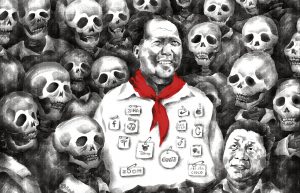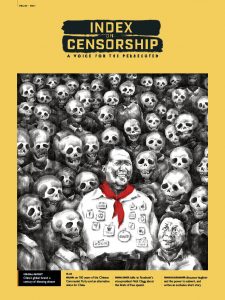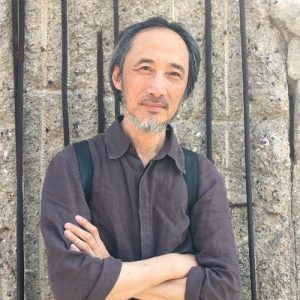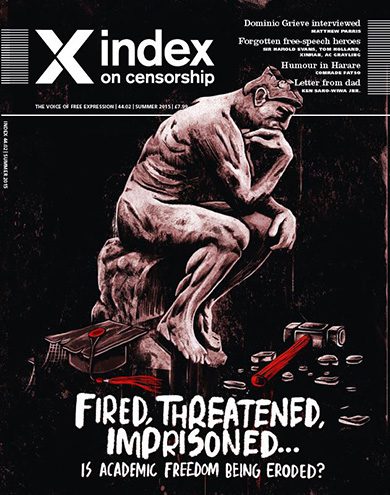28 Apr 21 | Africa, Burma, China, Hong Kong, Magazine, Magazine Contents, Slapps, United States, Volume 50.01 Spring 2021, Volume 50.01 Spring 2021 extras

Illustration: Badiucao
Index looks back on 100 years of the Chinese Communist Party and how their censorship laws continue to shape the lives of people around the world and threaten their right to free speech. Inside this edition are articles by exiled writer Ma Jian and an interview with Facebook’s vice-president for global affairs, former UK deputy Prime minister Nick Clegg; as well as an exclusive short story from acclaimed writer Shalom Auslander.
Acting editor Martin Bright said: “I am delighted to introduce the latest edition of Index which marks the 100th anniversary of the Chinese Communist Party.”
“This year also marks the 50th anniversary of the magazine and I am proud that we are continuing the founders’ legacy of opposition to totalitarianism.”
“In this Spring edition of Index we are particularly pleased to publish an exclusive essay by the celebrated Chinese writer Ma Jian, who suggests that an alternative tradition of tolerance and freedom is still possible.”
 A century of silencing dissent by Martin Bright: We look at 100 years of the Chinese Communist Party and the methods of control that it has adapted to stifle free expression and spread its ideas throughout the world
A century of silencing dissent by Martin Bright: We look at 100 years of the Chinese Communist Party and the methods of control that it has adapted to stifle free expression and spread its ideas throughout the world
The Index: Free expression round the world today: the inspiring voices, the people who have been imprisoned and the trends, legislation and technology which are causing concern
Fighting back against the menace of Slapps by Jessica Ní Mhainín: Governments continue to threaten journalists with vexatious law suits to stop critical reporting
Friendless Facebook by Sarah Sands: An interview with Facebook vice-president Nick Clegg about being a British liberal at the heart of the US tech giant
Standing up to a global giant by Steven Donziger: A lawyer who has gone head to head with the oil industry since 1993 at great personal cost tells his story
Fear and loathing in Belarus by Yahuen Merkis and Larysa Shchryakova: The crackdown on journalism has continued with arrests. Read the testimony of two reporters
Killed by the truth by Bilal Ahmad Pandow: Babar Qadri was one of Kashmir’s most strident voices, until he was gunned down in his garden
Cartoon by Ben Jennings: Arguments about the removal of statues cause a stir
The martial art of free speech by Ari Deller and Laura Janner-Klausner: The question of Cancel Culture continues to rage. Is it really a problem?

Ma Jian
Burning through censorship: Censorship-busting online organisation GreatFire celebrates its 10th anniversary
The party is your idol by Tianyu M. Fang: China’s propaganda is adapting to target young people
Past imperfect by Rachael Jolley: Four historians explain how the CCP shaped China and ask if globalisation will be its undoing
Turkey changes its tune by Kaya Genç: Uighur refugees living in Turkey find themselves victims of a change in foreign policy
The human face and the boot by Ma Jian: The acclaimed writer-in-exile reflects on 100 years of the CCP and its legacy of bloodshed
A moral hazard by Sally Gimson: Universities around the world and the CCP’s challenges to academic freedom
Director’s cuts by Chris Yeung: Hong Kong broadcaster RTHK has been squeezed by China’s tightening control
Beijing buys Africa’s silence by Issa Sikiti da Silva: Africa’s rich natural resources are being hoovered up by China
A new world order by Natasha Joseph: Journalist Azad Essa found when he wrote about China in Africa, his writing was silenced
A most unlikely ally by Stefan Pozzebon: Paraguay has long been an ally of Taiwan, but it’s paying an economic price
China’s artful dissident: A profile of our cover artist: the exiled cartoonist Badiucao.
Lies, damned lies and fake news by Nick Anstead: Fake news is rife, rampant and harmful. And we can only counter it by making sure that the truth is heard
Censorship? Hardly by Clive Priddle: Even the most controversial book usually finds a publisher after it has been turned down
A voice for the persecuted by Ruth Smeeth: As Index celebrates its 50 year anniversary, we note why free speech is still important

Collective ©ALEXANDER NANAU PRODUCTION
Don’t joke about Jesus by Shalom Auslander: An exclusive short story based on a joke by the acclaimed author of Mother for Dinner
Poet who haunts Ukraine by Steve Komarnyckyj: Vasyl Stus, the writer who remains a Ukrainian hero, 35 years after perishing in a Soviet gulag
The freedom of exile by Khaled Alesmael, Leah Cross: A young refugee Syrian writer on the love between Arab men
Forbidden love songs by Benjamin Lynch: Iran’s underground pop music scene upsets the regime
Reviews: Saudi Arabia’s murder of Jamal Khashoggi, USA Gymnastics and healthcare in Romania: we review three new documentaries
War of the airwaves by Ian Burrell: The Chinese government faces difficulties with its propaganda network CGTN
17 Aug 18 | Artistic Freedom, Equatorial Guinea, News and features
[vc_row][vc_column][vc_images_carousel images=”102246,102245,102244″ img_size=”full” speed=”3000″ autoplay=”yes”][vc_column_text]Ramón Nse Esono Ebale draws out of a desire to create a world that is different from the one he can see with his eyes. It was that desire that led to his arrest and detention in September 2017.
Ebale’s cartoons take aim at Teodoro Obiang, Equatorial Guinea’s long-time dictator, who has been in power since 1979, just two years after Ebale was born. Drawing under the pseudonym Jamon y Queso, his cartoons lambast Obiang for his corruption and the absurdities of his rule.
Ebale left the country in 2011 after he received threats from government supporters and has been living in Paraguay for the past six years. While there, Ebale co-authored a graphic novel called La pesadilla de Obi. In the novel, president Obiang wakes up one morning as an unemployed husband living in the slums of Malabo. The novel was censored in EG and had to be smuggled into the country.
When Ebale returned to renew his passport, which the embassy in Paraguay couldn’t do, in order to move to El Salvador to be with his family. He was arrested and charged with money laundering and counterfeiting.
After his arrest, cartoonists and organisations from around the world launched a campaign — #FreeNseRamon — calling for Obiang to free him. Ebale was awarded Courage in Cartooning Award by Cartoonists Rights Network International to bring attention to his case.
He was finally released in March 2018 after an officer confessed to arresting Ebale on false charges after he was told to by his superiors.
Ebale plans to continue with his criticism of both the government and president Obiang because although he is free, things haven’t changed in EG.
Ebale shared his thoughts during an email exchanged with Index on Censorship’s Sandra Osei-Frimpong.
Index: What did you fear will happen when you went back to Equatorial Guinea?
Ebale: Because of the reputation of the regime and president controlling EG, no one believed my trip will be peaceful. But I did not fear anything and was always prudent. My family was afraid but I don’t think I allowed them to see my fear.
Index: Did you have a contingency plan in place before you left Paraguay?
Ebale: My drawings were my protection. They tell my story and are evidence of what I’ve been through. One cannot stop it if someone plans to hurt them so my only plan was to have my drawings speak for me.
Index: How were you treated in prison?
Ebale: They tried to suppress the campaign asking for my freedom. I was treated better than others in prison because my family was working to set me free and there was also external pressure.
Index: What are your plans now that you’ve left EG again? Do you plan to continue with criticism of the government?
Ebale: My plans have not changed. I still love drawing. Just because I am free doesn’t mean the regime has ended so my plan has not changed. You get a break when you die so living is the only thing that you have.
Index: What effect if any do you think your cartoons and criticism has had on the situation in EG especially since it is censored there?
Ebale: By censuring me, they censure people that are discovering new things through social media. I use social media to spread my passion for drawing and my crazy political ideas. The impact was enormous because it gave us a new tool to use in our fight to democratise the country: caricatures. It continues on from the drawings.
Index: What effects do you think your cartoons has had on people/countries outside of EG?
Ebale: Outside of my country my drawings are competing honourably with other African artists in countries and situations that are possibly worse than mine. The facts that my drawings have fans that live far from my country shows that my drawings are having a positive effect.
Index: What changes do you hope to see in EG?
Ebale: I want my grandchildren to be able to peacefully live with me in Mikomeseng. I want us to be able to cross the border without military barrier to reach Bitam. This is not much to ask for but I wish for it.
Index: Do you plan on ever returning to EG?
Ebale: Yes. It is my home.
Index: The main reason why you went back to EG was to get a passport so you can be with your family in El Salvador. What have you told your son about EG? Do you think you will you ever take him there?
Ebale: My son was born in EG. when they detained me he was there to visit and support me. He knows everything and I did not have to explain it to him because he was in Eg with me the whole time. My daughter on the other hand I’ve had to explain things to although she is too young to understand everything because she was not there and has never lived in EG.
Index: What motivates you to create?
Ebale: I am motivated by the belief that I can create a world different from the one I see with my eyes or recreate it. When you go to sleep and dream, the dreams are like drawings and if you wouldn’t be able to draw it all if you tried. Sleeping and being awake are different because being awake allows you to see how those around you live and move. You should be motivated by what you see. Dreaming is like drawing without your hands.
Index:When did you start drawing political cartoons?
Ebale: I started with the newspaper La Verdad del CPDS.
Index:Is there a work or group of works that you are proudest of?
Ebale: Yes: 218 TRILOGY.. Next
[/vc_column_text][/vc_column][/vc_row][vc_row][vc_column width=”1/4″][vc_column_text]
[/vc_column_text][/vc_column][vc_column width=”3/4″][vc_column_text]
Index encourages an environment in which artists and arts organisations can challenge the status quo, speak out on sensitive issues and tackle taboos.
Index currently runs workshops in the UK, publishes case studies about artistic censorship, and has produced guidance for artists on laws related to artistic freedom in England and Wales.
Learn more about our work defending artistic freedom.[/vc_column_text][/vc_column][/vc_row][vc_row][vc_column][vc_custom_heading text=”Subscribe to the Index newsletter” font_container=”tag:h3|text_align:left” use_theme_fonts=”yes”][vc_column_text]To find out more about Index on Censorship and our work protecting free expression, join our mailing list to receive our weekly newsletter, monthly events email and periodic updates about our projects and campaigns. See a sample of what you can expect here.
Index on Censorship will not share, sell or transfer your personal information with third parties. You may may unsubscribe at any time. To learn more about how we process your personal information, read our privacy policy.[/vc_column_text][gravityform id=”20″ title=”false” description=”false” ajax=”false”][/vc_column][/vc_row][vc_row][vc_column][vc_basic_grid post_type=”post” max_items=”4″ element_width=”6″ grid_id=”vc_gid:1534500555883-1997cd5e-3a29-7″ taxonomies=”19377″][/vc_column][/vc_row]
26 Jun 15 | Academic Freedom, Academic Freedom Letters, Magazine, News and features, Turkey Letters, Volume 44.02 Summer 2015
With threats ranging from “no-platforming” controversial speakers, to governments trying to suppress critical voices, and corporate controls on research funding, academics and writers from across the world have signed Index on Censorship’s open letter on why academic freedom needs urgent protection.
Academic freedom is the theme of a special report in the summer issue of Index on Censorship magazine, featuring a series of case studies and research, including stories of how setting an exam question in Turkey led to death threats for one professor, to lecturers in Ukraine having to prove their patriotism to a committee, and state forces storming universities in Mexico. It also looks at how fears of offence and extremism are being used to shut down debate in the UK and United States, with conferences being cancelled and “trigger warnings” proposed to flag potentially offensive content.
Signatories on the open letter include authors AC Grayling, Monica Ali, Kamila Shamsie and Julian Baggini; Jim Al-Khalili (University of Surrey), Sarah Churchwell (University of East Anglia), Thomas Docherty (University of Warwick), Michael Foley (Dublin Institute of Technology), Richard Sambrook (Cardiff University), Alan M. Dershowitz (Harvard Law School), Donald Downs (University of Wisconsin-Madison), Professor Glenn Reynolds (University of Tennessee), Adam Habib (vice chancellor, University of the Witwatersrand), Max Price (vice chancellor of University of Cape Town), Jean-Paul Marthoz (Université Catholique de Louvain), Esra Arsan (Istanbul Bilgi University) and Rossana Reguillo (ITESO University, Mexico).
The letter states:
We the undersigned believe that academic freedom is under threat across the world from Turkey to China to the USA. In Mexico academics face death threats, in Turkey they are being threatened for teaching areas of research that the government doesn’t agree with. We feel strongly that the freedom to study, research and debate issues from different perspectives is vital to growing the world’s knowledge and to our better understanding. Throughout history, the world’s universities have been places where people push the boundaries of knowledge, find out more, and make new discoveries. Without the freedom to study, research and teach, the world would be a poorer place. Not only would fewer discoveries be made, but we will lose understanding of our history, and our modern world. Academic freedom needs to be defended from government, commercial and religious pressure.
Index will also be hosting a debate in London, Silenced on Campus, on 1 July, with panellists including journalist Julie Bindel, Nicola Dandridge of Universities UK, and Greg Lukianoff, president and CEO of Foundation for Individual Rights in Education, US.
To attend for free, register here.
If you would like to add your name to the open letter, email [email protected]
A full list of signatories:
Professor Mike Adams, University of North Carolina, Wilmington, USA
Monica Ali, author
Lyell Asher, associate professor, Lewis & Clark College, USA
Professor Jim Al-Khalili OBE, University of Surrey, UK
Esra Arsan, associate professor, Istanbul Bilgi University, Turkey
Julian Baggini, author
Professor Mark Bauerlein, Emory University, USA
David S. Bernstein, publisher, USA
Robert Bionaz, associate professor, Chicago State University, USA
Susan Blackmore, visiting professor, University of Plymouth, UK
Professor Jan Blits, professor emeritus, University of Delaware, USA
Professor Enikö Bollobás, Eötvös Loránd University, Hungary
Professor Roberto Briceño-León, LACSO, Caracas, Venezuela
Simon Callow, actor
Professor Sarah Churchwell, University of East Anglia, UK
Professor Martin Conboy, University of Sheffield, UK
Professor Thomas Cushman, Wellesley College, USA
Professor Antoon De Baets, University of Groningen, Holland
Professor Alan M Dershowitz, Harvard Law School, USA
Rick Doblin, Association for Psychedelic Studies, USA
Professor Thomas Docherty, University of Warwick, UK
Professor Donald Downs, University of Wisconsin-Madison, USA
Professor Alice Dreger, Northwestern University, USA
Michael Foley, lecturer, Dublin Institute of Technology, Ireland
Professor Tadhg Foley, National University of Ireland, Galway, Ireland
Nick Foster, programme director, University of Leicester, UK
Professor Chris Frost, Liverpool John Moores University, UK
AC Grayling, author
Professor Randi Gressgård, University of Bergen, Norway
Professor Adam Habib, vice-chancellor, University of Witwatersrand, Johannesburg, South Africa
Professor Gerard Harbison, University of Nebraska-Lincoln
Adam Hart Davis, author and academic, UK
Professor Jonathan Haidt, NYU-Stern School of Business, USA
John Earl Haynes, retired political historian, Washington, USA
Professor Gary Holden, New York University, USA
Professor Mickey Huff, Diablo Valley College, USA
Professor David G. Hoopes, California State University, USA
Philo Ikonya, poet
James Ivers, lecturer, Eastern Michigan University, USA
Rachael Jolley, editor, Index on Censorship
Lee Jones, senior lecturer, Queen Mary University of London, UK
Stephen Kershnar, distinguished teaching professor, State University of New York, Fredonia, USA
Professor Laura Kipnis, Northwestern University, USA
Ian Kilroy, lecturer, Dublin Institute of Technology, Ireland
Val Larsen, associate professor, James Madison University, USA
Wendy Law-Yone, author
Professor Michel Levi, Universidad Andina Simón Bolívar, Ecuador
Professor John Wesley Lowery, Indiana University of Pennsylvania, USA
Greg Lukianoff, president and chief executive, Foundation for Individual Rights in Education (Fire), USA
Professor Tetyana Malyarenko, Donetsk State Management University, Ukraine
Ziyad Marar, global publishing director, Sage
Charlie Martin, editor PJ Media, UK
Jean-Paul Marthoz, senior lecturer, Université Catholique de Louvain, Belgium
Professor Alan Maryon-Davis, King’s College London, UK
John McAdams, associate professor, Marquette University, USA
Timothy McGuire, associate professor, Sam Houston State University, USA
Professor Tim McGettigan, Colorado State University, USA
Professor Lucia Melgar, professor in literature and gender studies, Mexico
Helmuth A. Niederle, writer and translator, Germany
Professor Michael G. Noll, Valdosta State University, USA
Undule Mwakasungula, human rights defender, Malawi
Maureen O’Connor, lecturer, University College Cork, Ireland
Professor Niamh O’Sullivan, curator of Ireland’s Great Hunger Museum, and Quinnipiac University, Connecticut, USA
Behlül Özkan, associate professor, Marmara University, Turkey
Suhrith Parthasarathy, journalist, India
Professor Julian Petley, Brunel University, UK
Jammie Price, writer and former professor, Appalachian State University, USA
Max Price, vice-chancellor, University of Cape Town, South Africa
Clive Priddle, publisher, Public Affairs
Professor Rossana Reguillo, ITESO University, Mexico
Professor Glenn Reynolds, University of Tennessee College of Law, USA
Professor Matthew Rimmer, Queensland University of Technology, Australia
Professor Paul H. Rubin, Emory University, USA
Andrew Sabl, visiting professor, Yale University, USA
Alain Saint-Saëns, director,Universidad Del Norte, Paraguay
Professor Richard Sambrook, Cardiff University, UK
Luís António Santos, University of Minho, Portugal
Professor Francis Schmidt, Bergen Community College, USA
Albert Schram, vice chancellor/CEO, Papua New Guinea University of Technology
Victoria H F Scott, independent scholar, Canada
Kamila Shamsie, author
Harvey Silverglate, lawyer and writer, Massachusetts, USA
William Sjostrom, director and senior lecturer, University College Cork, Ireland
Suzanne Sisley, University of Arizona College of Medicine, USA
Chip Stewart, associate dean of the Bob Schieffer College of Communication, Texas Christian University, USA
Professor Nadine Strossen, New York Law School, USA
Professor Dawn Tawwater, Austin Community College, USA
Serhat Tanyolacar, visiting assistant professor, University of Iowa, USA
Professor John Tooby, University of California, USA
Meena Vari, Srishti Institute of Art, Design and Technology, Bangalore, India
Professor Leland Van den Daele, California Institute of Integral Studies, USA
Professor Eugene Volokh, UCLA School of Law, USA
Catherine Walsh, poet and teacher, Ireland
Christie Watson, author
Ray Wilson, author
Professor James Winter, University of Windsor, Canada

 A century of silencing dissent by Martin Bright: We look at 100 years of the Chinese Communist Party and the methods of control that it has adapted to stifle free expression and spread its ideas throughout the world
A century of silencing dissent by Martin Bright: We look at 100 years of the Chinese Communist Party and the methods of control that it has adapted to stifle free expression and spread its ideas throughout the world


